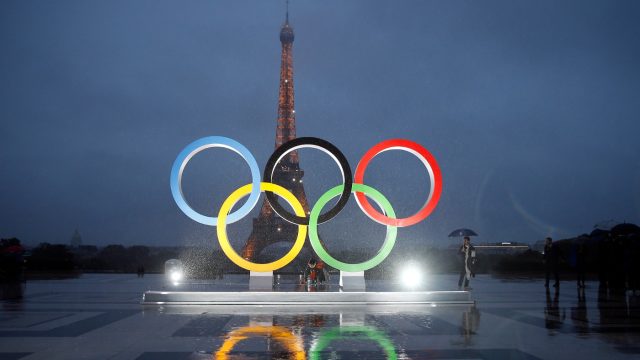
The flame for the Paris 2024 Olympics has been lit in ancient Olympia and will be handed to the French organisers in Athens on Friday 26 April after an 11-day torch relay through Greece.
After a night in the French embassy in Athens, the flame will then travel by boat to Marseille, where its procession through France will begin on 8 May.
When will the Games be held?
The opening ceremony of the Paris 2024 Olympics will be held along the Seine on Friday 26 July, but the sporting action kicks off 48 hours earlier. There is preliminary stage competition in football, rugby sevens, handball and archery on Wednesday 24 July and the Games will run until 11 August.
There are 329 medal events across 32 sports, with most of them being held in Paris. The surfing, however, will take place in Tahiti, an island in French Polynesia nearly 10,000 miles away from the Olympic Stadium (the repurposed Stade de France in Paris).
How many nations are taking part?
Around 10,500 athletes from 206 National Olympic Committees will compete. Team GB finished fourth at the Tokyo Games in 2021 with 64 medals, 22 of them gold, just one below their total medal haul from London 2012.
Ones to watch
Britain will win 66 medals this time, including 13 golds, according to a forecast by Nielsen’s Gracenote. Among the Team GB athletes to watch are Keely Hodgkinson, who hopes to go one better than her silver medal in the 800 metres at the Tokyo Olympics, the 15-year-old skateboarder Sky Brown, who won bronze last time aged 13, and Britain’s 1500m world champion Josh Kerr.
Familiar names lining up for Team GB will include the three-time Olympic gold medallist Max Whitlock in gymnastics, and diver Tom Daley, who is returning to competition after a two-year absence.
The United States is expected to win the most medals overall at Paris 2024 – 123, according to Gracenote’s Virtual Medal Table. Sprinter Sha’Carri Richardson could star on the athletics track, and Hunter Armstrong will be fancied to do the same in the swimming pool.
China is expected to finish second in the medals table, with teenage diving sensation Quan Hongchan and table tennis star Ma Long among those fancied for places on the podium.
What political issues are there?
France “doesn’t want politics to tarnish its big Olympics moment”, said Politico. “Good luck with that,” said the news site, because the chances of a “politics-free nirvana this summer look slim”, or “even non-existent”.
Among the political problems overshadowing the build-up to the Games are “the Russia-Ukraine war, the Israel-Hamas conflict, a dispute over public transport, terrorism, homelessness, furious booksellers on the Seine” and “even a surfing wave in Tahiti”.
Although Russian and Belarusian athletes will be allowed to compete as neutral athletes, they will not take part in the opening ceremony, said the International Olympic Committee. In response to this ruling, Vladimir Putin plans to unveil a “World Friendship Games” in Russia later this year, which is “quite the name coming from the president who launched the invasion of Ukraine”, said HuffPost.
The conflict in the Middle East is also expected to cast a shadow over proceedings. Given the controversy over Israel’s attacks on Gaza, the ruling about Russian athletes means “accusations of inconsistency are set to dog Olympic bosses with regard to Israeli athletes”, said Politico.
Meanwhile, there is controversy in Tahiti, which will host the surfing competition. Locals on the French Polynesian island have objected to the construction of new infrastructure because of its potential negative environmental impacts on coral reefs.
How will these Games be different?
There will be several new features for this Olympics. An equal number of male and female athletes are set to compete for the first time: 5,250 men and 5,250 women.
Breaking will make its full Olympic debut this year, with solo breakers improvising to the DJ’s tracks, pulling moves such as windmills, the six step and freezes. It was introduced at the 2018 Youth Olympics and “due to the combination of athleticism and urban dance, it has secured a spot on the programme” for Paris, said the BBC.
How can I watch?
The BBC will broadcast the action on its television channels, BBC iPlayer, the BBC Sport website and there will also be extensive coverage on BBC Radio 5 Live. If you want to attend events, tickets are on sale on the Paris 2024 website. The cost ranges from around €24 (£21) to €2,400 (£2,100).
Everything you need to know about the biggest event in sport






